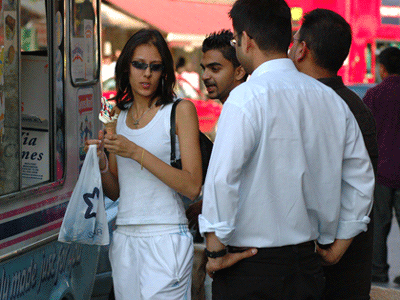 In many ways young Diaspora Asians are no different to any other young people. Many listen to the same sort of music, wear the same kind of clothes, do the same kinds of things in their spare time and have the same kinds of ambitions. Sometimes these things are complemented with their own distinctive cultural penchants, such as Bollywood movies, fusion music and subcontinental cricket.
In many ways young Diaspora Asians are no different to any other young people. Many listen to the same sort of music, wear the same kind of clothes, do the same kinds of things in their spare time and have the same kinds of ambitions. Sometimes these things are complemented with their own distinctive cultural penchants, such as Bollywood movies, fusion music and subcontinental cricket.There are, of course, more serious issues that impact their lives in a distinctive way.
Benefits and Pressures
There are benefits and pressures of having more than one culture. On the one hand, young diaspora Asians have the best of both worlds. Their life experience can be seen as richer and more diverse than those who have knowledge of only one culture. They can have bhangra and rock, chapatis and chips, Bollywood and Hollywood.
On the other hand, they have to balance the demands of living in cultures which sometimes conflict with each other. Some feel they don’t fully belong to any culture, never fully accepted in either world.
For example, many young British Asians are passionate about football, yet relatively few brave the terraces for games as there still remain racist elements among supporters. Asian fans of the English football team can still encounter racist abuse from other England supporters. This response may partly explain why young diaspora Asians so enthusiastically support the South Asian national cricket teams.
Increasingly, young Asians are seeking careers in the performing arts, and although great inroads have been made so that it is no longer a novelty to see a brown face on stage or screen, the numbers who succeed to the highest level are very few.
Alcohol can be an issue for some young Asians, especially in places such as the UK where it is so much part of the national culture. While some take to the national pastime with gusto, others abstaining from it for religious reasons can find themselves isolated from their peers.
Young Asians visiting their country of origin often experience mixed feelings. It can be an eye-opener, especially when visiting for the first time, an opportunity to learn and immerse themselves in their culture, as well as build relationships with relatives. Some do feel greater acceptance, but others still feel like foreigners even if, for a change, they look like everyone else. Accents can be the biggest giveaway, even if there is some knowledge of the mother tongue. But the greatest differences can be in perspectives.
For young Asians born and bred on the subcontinent, it may be hard to appreciate the difficultly in balancing more than one culture or how it feels to experience racism.
There was a time not so long ago when young diaspora South Asians regarded their cousins back home as backward, in dress and in attitudes. This is changing, especially in the larger South Asian cities, where young Asians are turning their back on certain traditional values. In some cases young diaspora Asians can seem more conservative. Bollywood is a good indicator of this, with some films and stars going out of their way to challenge traditions, which can influence, bemuse and confuse young Asians.
Racism Is Still An Issue
Race relations have undoubtedly improved since the parents or grandparents of young diaspora Asians first set foot in their new homelands, but racism is still an issue for many young people, especially with regard to job prospects. It can be even more frustrating for generations born and bred in the UK, than for the earlier generation who were newcomers.
The threat of terrorism and a backlash against political correctness have caused tensions in relations between different ethnic groups, with young South Asians sometimes bearing the brunt of this.

Family Expectations
As mentioned in the section on marriage, for many South Asian parents the main goal in life is to see their children educated and married, so they can have a secure future. While these are not unreasonable aims, the pressure to ‘succeed’ in these areas can place a strain on some young Asians.
While some achieve great success, encouraged by their parents’ support and sacrifice, others get bogged down by the pressure and can feel like failures in the eyes of not only their parents, but the extended family, too. The tendency of some Asian parents to boast about and compare their offspring can heighten this.
Asian families are generally more conservative than other families and may disapprove of things considered the norm for other young people. This is especially true in their expectations of the way girls should behave. Alcohol consumption, dating and night clubs can all be contentious issues in Asian households. The result of this can be open rebellion, secrecy or eventual compromise. It can be a struggle for young Asians to balance traditional home lives with the demands of living in a secular culture with very different values and priorities.
The tension of appeasing parents and keeping up with peers is something most young people experience, but for young Asians this can feel more acute. Many do not share their problems with their parents as they feel the pressures they face are too different to their parents’ experiences when they were young.
Religion and Religious Identity
Religion plays a far more important role in the lives of young Asians than it does for most other young people, mainly because they are more likely to come from religious families. Even if they are not particularly religious themselves, many see it as part of their identity and even if they do not regularly practice their faith, it can have an influence on big issues in their lives such as the choice of a marriage partner.
Despite living in a secular society, there are a number of young Asians who choose to assert their religious identity. The most obvious example is that of young Muslims, with many more young women wearing the hijab than just a few years ago. Partly as a response to this, other young Asians are also choosing to identify themselves by their religion.
Distinguishing religious identity from personal faith is something young Asians need to work out for themselves.
South Asian Concern
Leave a Comment: